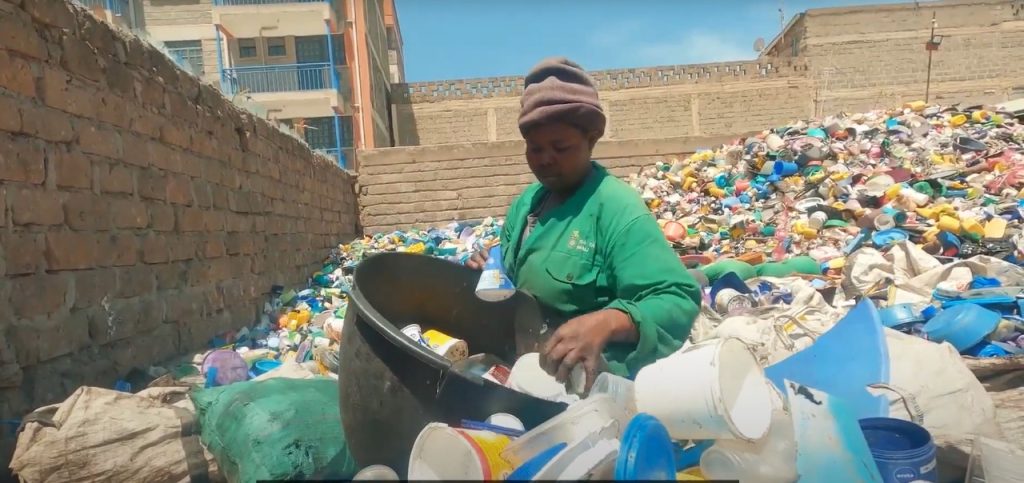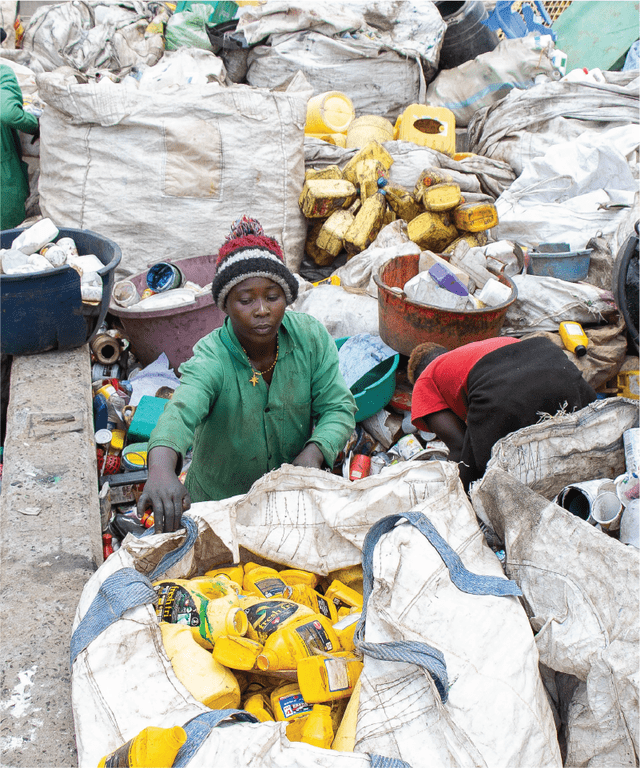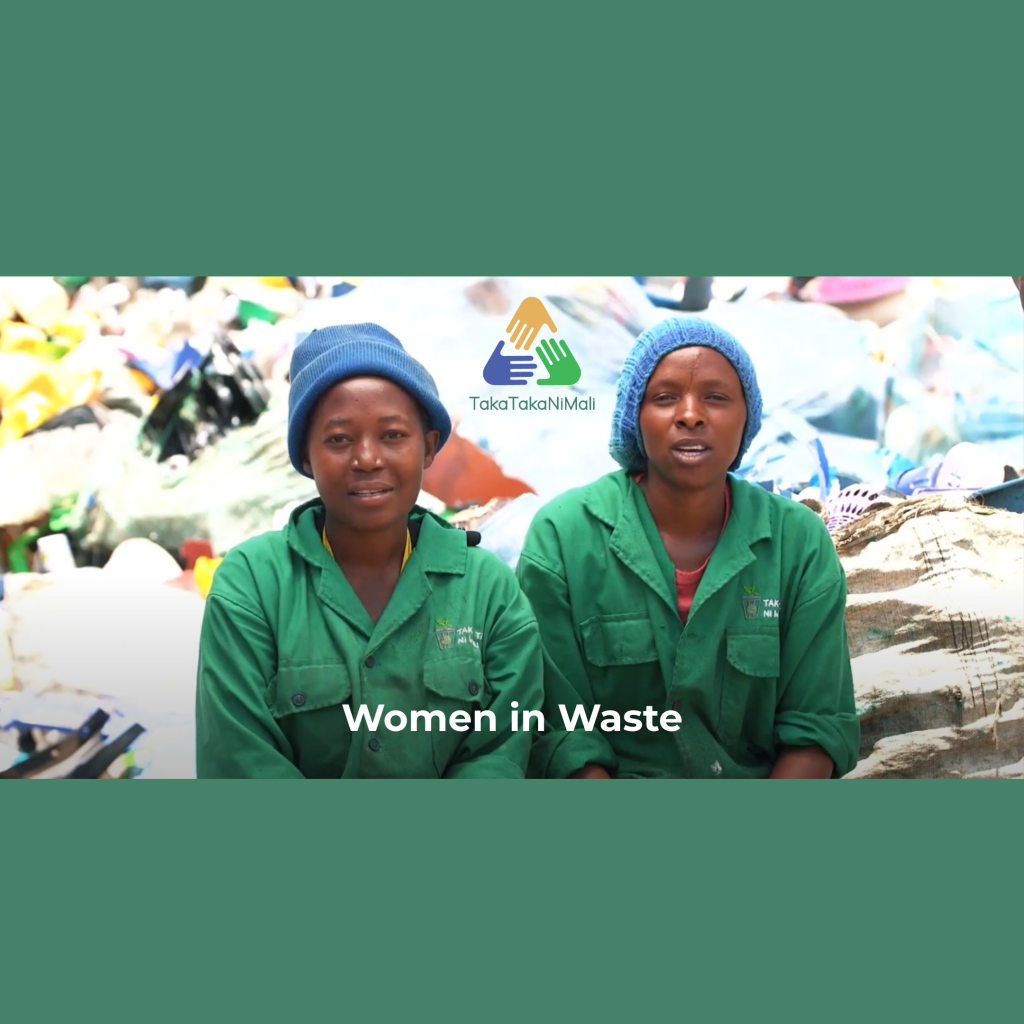When you toss out your trash, do you ever stop to think about who handles it next? In Kenya, discussions around waste management often focus on policies, technology, and infrastructure, yet the people who make the system function, especially women, are frequently overlooked.
Think about it: sources indicate that women constitute a large, but largely marginalized, workforce in this sector, making up around 60% of informal waste workers in Nairobi. From our households to massive dumpsites, and from brilliant grassroots innovations to formal boardrooms, women are quietly driving the country’s waste management journey.
Global and Local Insights: Women in Waste
Globally, the United Nations Environment Programme (UNEP) highlights the “double burden” women face in waste: unpaid responsibilities at home, coupled with under-recognized and underpaid roles in the informal economy.
A global survey by the International Solid Waste Association (ISWA) Women of Waste (WoW!) II, covering 600+ women across 75 countries, found:
- Education & leadership: 87.7% had tertiary education; 61% held management roles.
- Active across value chains: From recycling (33.3%) to collection and transfer (19.4%).
- Pride in purpose: Two-thirds expressed pride in their work, seeing waste management as a mission.
- Persistent barriers: Younger women (21–25) reported high harassment levels, and many left the sector by 30 years due to systemic constraints.
Kenya reflects these global trends. At Dandora dumpsite, Nairobi’s largest and oldest landfill, 2,000–2,500 tonnes of waste are dumped daily. Communities like Kariobangi, Baba Dogo, and Korogocho suffer the consequences: toxic smoke, polluted rivers, respiratory illnesses, and unsafe working conditions.
Here, women rise before dawn to collect recyclables, earning as little as KES 10 per kilogram of PET plastic. They face stigma, exploitation, and hazardous conditions.With recognition, fair pay, protective gear, and inclusion in formal systems, their role could shift from survival to leadership in powering the circular economy.

What makes their Job so hard?
Informal waste workers in Kenya, both men and women, deal with challenges that go way beyond the physical act of handling trash. When structured systems, protective gear, and financial support are missing, everyone is exposed to major risks. These interconnected problems trap them in a difficult cycle.
Here’s what these workers face, with special attention to how the burden lands on women:
- Health and Safety Risks: Picture this: working daily without essential protection like gloves, masks, or protective footwear in a dumpsite. The lack of proper waste management exposes all workers to infectious diseases, toxins, and injuries. For women, these dangers are often amplified by issues like a lack of sanitation for menstrual hygiene and greater vulnerability to reproductive health complications due to continuous exposure to toxins.
- Economic Insecurity: All informal workers struggle with exploitative pay, often earning just KES 10–35 per kilogram of plastic. It’s nearly impossible to live on that, let alone save or invest! Without access to simple things like credit, loans, or grants, formalizing or scaling their promising businesses is a huge challenge for anyone in this sector.
- Social and Gendered Burdens: The stigma of “dirty work” chips away at the social dignity of every waste picker. However, women face additional, intersecting challenges:
- They disproportionately bear unpaid care duties. This often forces mothers to bring their children into these dangerous waste environments, continuing the cycle of poverty and vulnerability for the next generation.
- Unregulated dumpsites expose them to a very real risk of gender-based violence and harassment, an issue overwhelmingly faced by women.
They aren’t victims: They are change-makers!
Despite these challenges, women are proving to be powerful change-makers in the waste sector.
1. Household Leadership
At the most basic level, women are the backbone of waste segregation at source. In many Kenyan households, women play a central role in determining how waste is managed. With the right education and awareness on the importance of separation, they can effectively sort plastics from organic matter, glass from paper, and ensure that collection is done correctly.
2. Grassroots Innovation and Entrepreneurship
Across Kenya, women are building businesses that turn waste into opportunity. From converting plastic into paving blocks and eco-fence posts, to transforming food waste into organic fertilizers, women-led enterprises are creating jobs, reducing environmental pressure, and demonstrating the value of a circular economy. These ventures prove that waste is not just a problem, but a resource that can fuel inclusive economic growth.
3. Advocacy and Policy Influence
Women leaders in the sector are also stepping into advocacy roles, pushing for policy changes that protect informal workers and support sustainable waste solutions. Their lived experiences, from the challenges of waste picking to the realities of recycling markets, provide practical insights that policymakers cannot afford to ignore.

Voices from the field
We could share statistics all day, but nothing is more powerful than hearing directly from the women doing the work.
Grace Wamboi – GRACA Enterprises, Nairobi
“My name is Grace Wamboi, and I have been in the waste management business for the last 25 years. I run my business under the name GRACA Enterprises in Nairobi, where I collect and sell valuables from waste.
For many, waste is seen as dirty work, but to me it is like any other business. Through this business, I have been able to feed my family, raise my children, and build a livelihood that I am proud of.
Waste management is unique in that it has little direct competition compared to other sectors, but it comes with its own challenges. As a woman, I have often been looked down upon, especially when marketing my waste materials. Many people assume that women cannot handle the waste business as well as men.
Another big challenge that women waste pickers face is exploitation by aggregators, who pay very little for the waste they collect. This makes it difficult for women to improve their livelihoods despite their hard work.
Challenges will always be there ,just like in any other business. But I encourage more women to join the waste sector, not only to create income for themselves but also to contribute to environmental cleanliness and the circular economy.
Waste is not just trash, it is opportunity.”
Lilian Kariuki – Waste Entrepreneur, Kayole, Eastlands, Nairobi
“I started my business after I was terminated from my job at a steel company. The company’s machines were designed to crush plastics and other materials, and that exposure sparked my interest in the waste sector. I realized that waste could be transformed into valuables that can be sold at a greater value, while also contributing to a cleaner environment.
My termination was not easy. I was taking care of a sick loved one, and because I stayed home longer than they were willing to accommodate, I lost my job. By then, I had already exhausted my savings. But instead of giving up, I dared to start my own waste business, even with the very little capital I had left.
It has now been two years, and I am proud of the progress I have made. The biggest challenge has been the high cost of licenses, which makes it difficult to formalize and scale the business.
As a woman in this sector, I encourage other women to join. This business is rewarding , it pays my bills and even allows me to invest. Most importantly, it gives me the satisfaction of knowing that I am contributing to protecting our environment.”
Way forward
To unlock the full potential of women in waste management, we must move beyond recognition to concrete action:
•Formalize the informal sector: Provide waste pickers with legal recognition, fair wages, protective gear, and access to social protection such as health insurance.
•Support women-led innovations: Invest in training, financing, and markets for women-owned waste enterprises that create jobs and sustainable products.
•Educate at the household level: Equip women (and men) with knowledge and tools to improve segregation, recycling, and composting practices at home.
•Promote inclusivity in policy-making: Ensure women in the waste sector have a seat at the decision-making table where laws and systems are designed.
Conclusion
Women are at the heart of Kenya’s waste sector—as innovators, entrepreneurs, and leaders. Supporting women in waste is about more than environmental sustainability; it is about equity, dignity, and economic empowerment.
The next time you toss out your trash, remember, behind Kenya’s circular economy are women turning waste into wealth. With the right support, they can power a future that works for people, planet, and prosperity.
